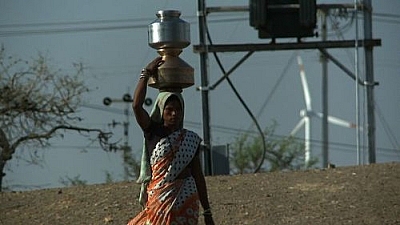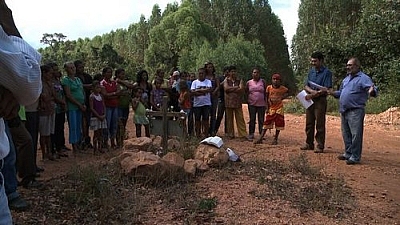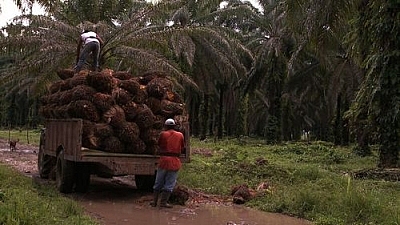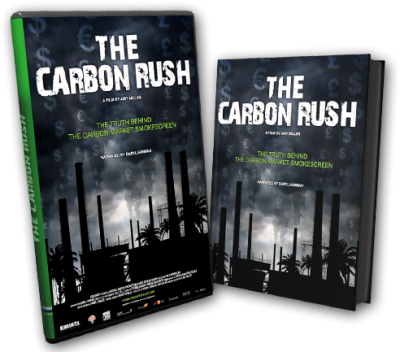The Carbon Rush, which screened last fall at Cinéfest Sudbury International Film Festival, is Sudbury-born Amy Miller’s latest social justice documentary. While its topic is environmental, the film’s theme is political. Motivated by a desire to exploit Canada’s role on the international carbon market, Miller found she first needed to explain what offset projects are and who they harm. Miller, now based in Montreal, travelled across the globe to shoot footage for The Carbon Rush, witnessing first-hand the poverty and illness resulting from this supposedly green for-profit industry.

Narrated by actress Daryl Hannah, The Carbon Rush rolls smoothly through animations, infographics, interviews, live footage, and eye-catching video montages. Presenting poignant true story examples, it demonstrates what carbon offset projects are, why they are falsely touted as a benefit to the Global North, and how they are negatively impacting the Global South. Because Miller wanted to offer a “critical analysis of the way the world works,” she and her crew journeyed to Brazil, Panama, Honduras, the UK, Scotland, Hungary, and India to meet the children, families, women, labourers, displaced property owners, and communities suffering in the name of carbon trading.

Those who are familiar with the carbon market might expect the film to scrutinise the industry from the top down — that is, to determine whether the projects in question actually help reduce or at least stabilise carbon emissions overall by investing in green projects, which is their purported goal. While the effectiveness and eco-friendliness of the projects are indeed questioned, Miller took the bottom-up perspective, letting the people — those sick and dying from pollution, deprived of water in the name of the environment, robbed of their lands or unemployed from profit-driven motives, and bullied or violently harmed for political gain — tell their own stories. Powerful and evocative, The Carbon Rush reveals the real effects of this grossly inadequate solution to the climate crisis.
Amy Miller has long been an advocate for social justice. Growing up in Sudbury where the wealth generated from resource extraction mostly flows outside the area “off the backs of the labour of others,” leaving only devastating environmental and health consequences behind, Miller became involved in issues of inequality early on. She fondly remembers the solidarity on the teachers’ picket line during the Harris days. Acting from a “genuine belief that transformative change is possible,” Miller has participated in many peaceful protests since then, including the Seven Year Squat in Ottawa and the G-20 in Toronto.

Coming home for Cinéfest was an “incredible honour” for Miller, who first went to the renowned festival as a young teenager in 1994. For the next several years, it helped her “develop an understanding of national and international cinema,” introducing her to films outside of Hollywood. Now, Miller is establishing herself as a filmmaker in her own right. Prior to The Carbon Rush, Miller directed Outside of EUrope and Myths for Profit: Canada’s Role in Industries of War and Peace. She is currently working on her next documentary, War for Soil, an exploration of the economic policies stimulating agricultural land grabs worldwide. More info about each of these documentaries is available through Wide Open Exposure, Miller’s production company.
The overarching message in Miller’s documentaries is of social justice and equality. With The Carbon Rush, she leaves viewers to contemplate the climate crisis and its causes. She brings the audience to acknowledge that industrial capitalism is leading to the problems portrayed in the film, concluding that quickly transitioning away from a free market economy is the only solution. Miller notes that Sudbury has recognised this and has done a good job in the past decade or so of moving away from a resource-based economy. For the country as a whole, Miller says the most important step is to stop the expansion of the tar sands and to shut them down completely. Despite such serious subjects, The Carbon Rush ends with tradition, song, and hope.

The film has been well-received on the international festival circuit. The Carbon Rush‘s World Premiere was at The Green Nation Film Festival in Rio de Janeiro, Brazil. It has screened at the Planet in Focus Environmental Film Festival and the Bloor Hot Docs Canadian International Documentary Festival in Toronto, the Rencontres internationales du documentaire de Montréal, the Miami and the Beaches Environmental Film Festival in Florida, and the Vancouver International Film Festival. It was even featured at a bike-powered outdoor screening at the Take One Action Film Festival in Edinburgh, Scotland.
Three more showings will cap off 2012. Those in the Thunder Bay area can catch The Carbon Rush on December 6 at 8 p.m. as part of the Docs on Bay series hosted by the Bay Street Film Festival. There will also be a screening in Kitchener-Waterloo on December 12, while the Mayfair Theatre in Ottawa will feature the film December 21-23.
Or, order the book or DVD and play the social game at The Carbon Rush‘s website.
Update
Since this article was written, The Carbon Rush has notably appeared at the Festival du film vert in Switzerland, the UN Climate Change Conference (COP18) in Doha, Qatar, the Human Rights Human Wrongs Film Festival in Oslo, Norway, and the Festival international du film environnementale in Paris, France.
The Carbon Rush continues to screen at film festivals and other venues around the globe. At the time of this update, screenings are scheduled for March 19 at the Université de Montréal and March 28 at Ryerson University in Toronto. Keep up with new screening announcements via The Carbon Rush‘s Facebook page.
This article originally appeared in the December 2012-January 2013 issue of Simplified Living Magazine. All images courtesy of The Carbon Rush.




Search Niackery
×